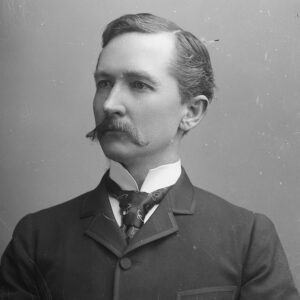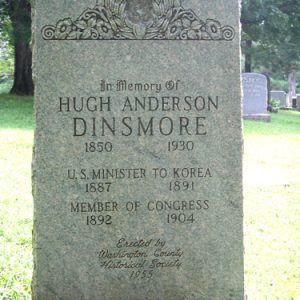calsfoundation@cals.org
Hugh Anderson Dinsmore (1850–1930)
Hugh Anderson Dinsmore was the first Arkansan from Benton County appointed as a U.S. foreign minister. Dinsmore also served three years as a circuit clerk, six years as a prosecuting attorney, twelve years in Congress, and several years on the board of trustees for the University of Arkansas (UA) in Fayetteville (Washington County).
Born on the family homestead in Cave Springs (Benton County) on December 24, 1850, Hugh Anderson Dinsmore was the eldest of five children born to Alexander Winchester Dinsmore and Catherine Anderson. In 1860, before the outbreak of the Civil War, his father owned six slaves and one of the five general stores operating in Bentonville (Benton County). Dinsmore was educated in Benton County schools and the Ozark Institute in Washington County. He worked as a store clerk and later a traveling salesman for a St. Louis firm.
Upon resolving to pursue a career as a lawyer, he decided on Samuel N. Elliott of Bentonville to proctor him. In 1872, Governor Elisha Baxter appointed Dinsmore the eleventh Benton County Circuit Court clerk. He resigned in 1874, when he was admitted to the bar. The following year, Dinsmore moved to Fayetteville, where he entered into a law partnership with David Walker. Three years later, running unopposed, he was elected prosecuting attorney for the Fourth Judicial District, which covered eight counties. Dinsmore served as prosecuting attorney until 1884.
Dinsmore married Elizabeth Le Grand Fisher of St. Louis, Missouri, on May 25, 1883. They had one son. Just three years after marriage, Elizabeth died on June 19, 1886; Dinsmore never remarried.
In 1884, Dinsmore was a presidential electorate for the Electoral College on the Democratic ticket when Grover Cleveland was elected the first Democratic president after the Civil War. That same year, he sought the Fifth District Congressional seat held by Colonel Samuel W. Peel. U.S. senator and former governor James H. Berry, Peel’s brother-in-law, quietly supported Dinsmore.
After Dinsmore lost to Peel, Berry submitted his name to President Cleveland, asking that he be appointed the American diplomat to Korea. On January 6, 1887, Cleveland sent the name of Dinsmore to the Senate for confirmation, and on January 13, the Senate confirmed the selection.
Dinsmore arrived as America’s minister to Korea, where previously an envoy had served. A Presbyterian newspaper recounted how the Korean treasury was the victim of thieves until Dinsmore “ingratiated himself with the emperor by inaugurating the first armed guard in Korea.” Minister Dinsmore wrote to his family that Emperor Ko-Jong expressed to him, “I shall take you more fully into my counsel than any foreign representative—first because you are the highest diplomatic officer here and secondly because you are an American.” When his term was to expire, the emperor sent word to Washington DC that he desired Dinsmore to remain. He stayed about one year into the Republican administration of Benjamin Harrison before being replaced. The emperor offered Dinsmore the position of Counselor of the Kingdom when his term ended, but Dinsmore declined, wishing instead to return to Arkansas. He ended the ministerial position on May 25, 1890.
Elected to Congress in 1892, Dinsmore replaced Samuel W. Peel and served five succeeding terms, until 1905, representing the Fifth Congressional District for four terms until realignment placed him in the Third District. No record that he authored any notable legislation during his service exists.
After his unsuccessful race for reelection in 1904, Dinsmore returned once again to Fayetteville, where he retired from political life and resumed a limited legal profession with Judge E. S. McDaniel while becoming involved in fruit farming.
On November 26, 1905, Dinsmore and Governor Jeff Davis, who was running against Senator Berry for his U.S. Senate seat, became embroiled in a physical altercation at the Washington Hotel in Fayetteville. The governor was in town campaigning against Berry. News accounts said the clash was over a letter Dinsmore claimed the governor stole, said letter being written by Berry to Dinsmore. Davis struck the ex-congressman with his cane, breaking it. This was the same cane he previously used to strike Arkansas Supreme Court Assistant Judge Carrol D. Wood in Hope (Hempstead County). Dinsmore subsequently pulled a gun and “pistol-whipped” the governor. No shots were fired, and neither man was arrested. The newspaper called the Davis-Berry campaign “the vilest and meanest state campaign ever witnessed in Arkansas.”
Governor Thomas C. McRae appointed Dinsmore to a ten-year term on the board of trustees of UA starting in 1921, a position Dinsmore’s father had held from 1874 to 1883.
Dinsmore died on May 2, 1930, at Barnes Hospital in St. Louis, Missouri, where his physician had taken him for treatment for “carcinoma of the bladder.” He is buried in Evergreen Cemetery in Fayetteville. The Washington County Historical Society placed a marker on his grave in 1955.
For additional information:
Black, J. Dickson. History of Benton County. Little Rock: International Graphics Industries, 1975.
Hugh Anderson Dinsmore Papers. Special Collections. University of Arkansas Libraries, Fayetteville, Arkansas.
Rose, F. P. “Hugh Anderson Dinsmore.” Arkansas Historical Quarterly 11 (Spring 1952): 69–78.
John Spurgeon
Bella Vista, Arkansas
 Post-Reconstruction through the Gilded Age, 1875 through 1900
Post-Reconstruction through the Gilded Age, 1875 through 1900 Hugh A. Dinsmore
Hugh A. Dinsmore  Hugh Dinsmore's Tombstone
Hugh Dinsmore's Tombstone 




Comments
No comments on this entry yet.